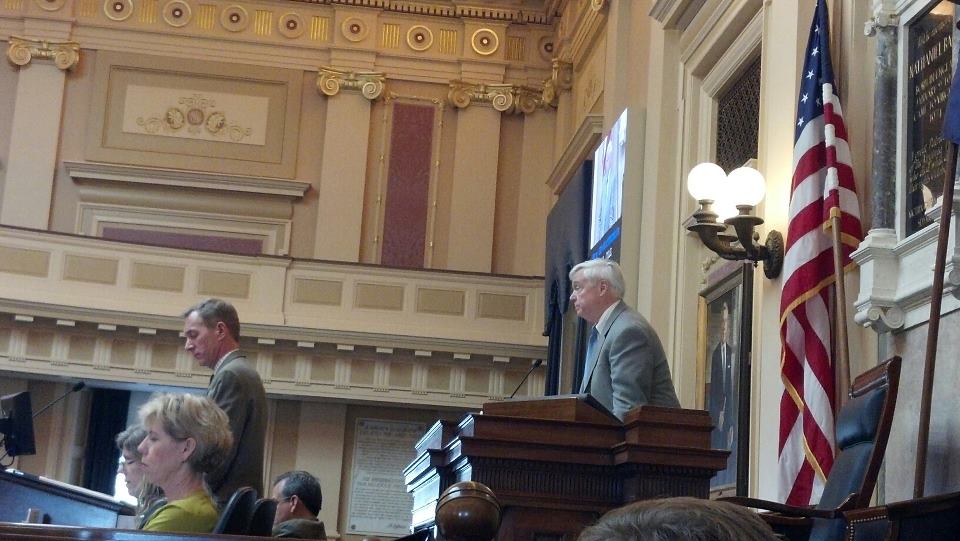Highlights from ACORE’s National Renewable Energy Policy Forum
Cross posted from Scaling Green; this is what I was up to yesterday. Thanks to Kathy in Blacksburg for ably covering Blue Virginia while I was focused on clean energy.
 I had the pleasure yesterday of attending the National Renewable Energy Forum, sponsored by the American Council On Renewable Energy (ACORE), in the Cannon House Office Building in Washington, DC. I “live tweeted” the event at the Scaling Green Twitter feed, and also recommend that you take a look at the Twitter feeds of Greentechmedia reporter Stephen Lacey, Clean Tech Nation author Clint Wilder, and ACORE Vice President Tom Weirich. Finally, I recommend Stephen Lacey’s report on how conservative Congressman Steve King strongly supports federal assistance to renewable energy.
I had the pleasure yesterday of attending the National Renewable Energy Forum, sponsored by the American Council On Renewable Energy (ACORE), in the Cannon House Office Building in Washington, DC. I “live tweeted” the event at the Scaling Green Twitter feed, and also recommend that you take a look at the Twitter feeds of Greentechmedia reporter Stephen Lacey, Clean Tech Nation author Clint Wilder, and ACORE Vice President Tom Weirich. Finally, I recommend Stephen Lacey’s report on how conservative Congressman Steve King strongly supports federal assistance to renewable energy.
Now, here are a few highlights from my notes and tweets of the conference.
- ACORE President and CEO Dennis McGinn, who ran a smooth and information-packed forum yesterday, repeatedly emphasized that point that renewable energy is the answer on several important fronts: national security, the economy and jobs, health and the environment. Vice Admiral McGinn also stressed the need for “federal and state policies that unlock new sources of capital from the private sector and create market certainty.”
- Forum co-chair Roger Ballentine of Green Strategies noted that there has been “more than $500 billion in private sector investment in renewable energy technology in the past two years,” and that “the cost of solar, wind and other renewable energy sources continues to decline.”
- Kathleen McGinty of Weston Solutions argued that “America has an opportunity to capture significant portions of the clean energy marketplace, not only domestically, but throughout the world,” that “[c]reating a clean energy economy is vital to boosting our economy,” and that “[m]ore renewable energy leverages investment, creates jobs, and helps the environment…a win-win for everyone.”
- Interior Department Secretary Ken Salazar noted the importance of pushing ahead aggressively on clean energy, so that we’re not hostage to foreign oil or the realities of climate change. Salazar pointed to the enormous potential of both onshore and offshore renewable energy in the United States, as well as great progress made the past 4 years, and stressed the need to upgrade our country’s transmission grid, because it’s “stranded energy” unless we can get that wind and solar power from where it’s produced to where it’s demanded. Salazar stressed the importance for the clean energy industry of turning “skeptics” into “believers” by showing the success of actual projects “on the ground.” Finally, Salazar argued that a stable policy environment is crucial to realizing clean energy’s full potential as rapidly as possible.
- Ethan Zindler of Bloomberg New Energy Finance gave a detailed presentation about the current state of the renewable energy industry, as well as where we’re headed. Zindler explained that with U.S. coal-fired power in rapid decline, opportunities are opening up for both renewables and also for natural gas. Regarding natural gas, Zindler believes the current low price is not sustainable for producers and will have to rise. At the same time, Zindler sees the levelized cost of energy for renewable power as starting to become competitive without subsidies, which means that the long-term outlook is highly bullish, despite a possibly rocky next couple years. As Zindler told me after his presentation, he agrees with BloombergNew Energy Finance CEO Michael Liebreich, who recently declared that clean energy is “going to win” in the medium- to long-term.
- There was a great deal of discussion yesterday, particularly on Stanford Law Professor Dan Reicher’s panel (“Finance Meets Policy: Beyond Tax Credits”), that energy “policies must move beyond traditional tax credits and enable the sector to tap into much larger sources of private capital.” Patrick Eilers of Madison Dearborn Partners, among others (e.g., Assistant Secretary for Energy Efficiency and Renewable Energy David Danielson), pointed specifically to expandingMaster Limited Partnerships (MLPs) and Real Estate Investment Trusts (REITs) for clean energy, to standardization of contracts, to financial innovation in general, and to a focus on reducing “soft costs.”
- A common theme yesterday, best expressed by Neil Auerbach of Hudson Clean Energy Partners, was the need for renewable energy to be “at the table” or “on the menu.”
- Federal Energy Regulatory Commissioner John Norris stressed the need for upgrading the power grid, noting that it’s a “challenge,” and also currently “an impedance to bringing some renewable energy online.” Norris also argued that the lack of a coherent national energy policy means that we’re developing our renewable energy potential, and bringing it to market, “much less efficiently, slowly than we could.”
- Joseph Desmond of BrightSource Energy commented on policies to facilitate market access for renewable energy storage technology and transmission.
- Nancy Pfund of DBL Investors made a number of interesting points in her presentation, such as that fossil fuels have been federally subsidized to a far greater degree than renewable energy over the years, including tax preferences for oil and gas, which she called “the gift that keeps on giving.” Pfund added that renewable energy has actually been undersubsidized to a great degree relative to fossil fuels. Despite this skewed playing field, Pfund argued that renewable energy has been experiencing a great degree of success in recent years. She further noted that this success has led fossil fuel “incumbents” to become increasingly worried and to launch challenges to policies (e.g., net metering, the Production Tax Credit) that are favorable to clean energy.


In sum, I’d say that yesterday’s conference provided an excellent snapshot of the clean energy industry following one of its best years in history, with a highly promising future ahead of it, yet with challenges still to be addressed and overcome. No doubt, though, if the sentiment at the ACORE conference yesterday was any indication, it’s an exciting time to be involved in clean energy!










